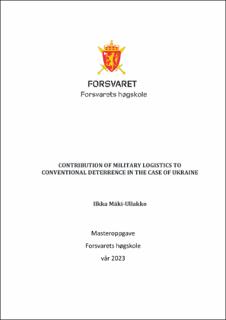Contribution of military logistics to conventional deterrence in the case of Ukraine
Master thesis
Permanent lenke
https://hdl.handle.net/11250/3087355Utgivelsesdato
2023Metadata
Vis full innførselSamlinger
- Masteroppgaver [466]
Sammendrag
The outbreak of the war between Russia and Ukraine and the means used have shown the revival of conventional deterrence in today's world. The expansion of the war has required significant resources and the role of logistics in the conduct of the war has been emphasized. Logistics has been studied extensively as part of warfare, but its importance for deterrence has been studied very little.
The purpose of this case study is to understand the importance of strategic logistics to conventional deterrence strategy by exploring the relationship between logistics and deterrence in the case of Ukraine. The research answers the question, how did conventional deterrence and logistics contribute to deterrence failure against Russia in the case of Ukraine? To answer the research question, the study examines three cases in which we examine to what extent conventional deterrence and logistics contribute to deterrence failure. The selection of cases is based on the attack strategies used by Russia against Ukraine, which were Limited Aims strategy, Blitzkrieg Strategy and Attrition strategy.
The research is a qualitative basis, where the case study method was applied. The framework of the research is conventional deterrence and strategic logistics. Empiris' material consists of assessments and research reports regarding the war in Ukraine. A content analysis was used for the analysis of the empirical data, where the analysis categories were based on the theoretical framework of the study. Each research question was answered by examining capability and military logistics deficiencies that led to the failure of conventional deterrence against the various offensive strategies used by Russia.
The main findings of this study were that Military Logistics and its performance have a connection with conventional deterrence, which varies against different strategies of a potential attacker. Against the Limited Aims and Blitzkrieg strategies which are based on speed, high readiness, and the ability to start countermeasures quickly are emphasized, which in terms of logistics means high availability, self-sufficiency, and the ability to respond to a quick situational framework by establishing or deploying forces. Against a strategy based on attrition, in terms of logistics, a credible ability to scale and allocate resources to the struggling forces is highlighted. Logistics can be considered as a multiplier for two main elements for deterrence, which are capability, and credibility.
The results help to understand the relationship between logistics and conventional deterrence against different strategies of a potential adversary. This helps to develop increasingly effective deterrence strategies against potential adversaries
